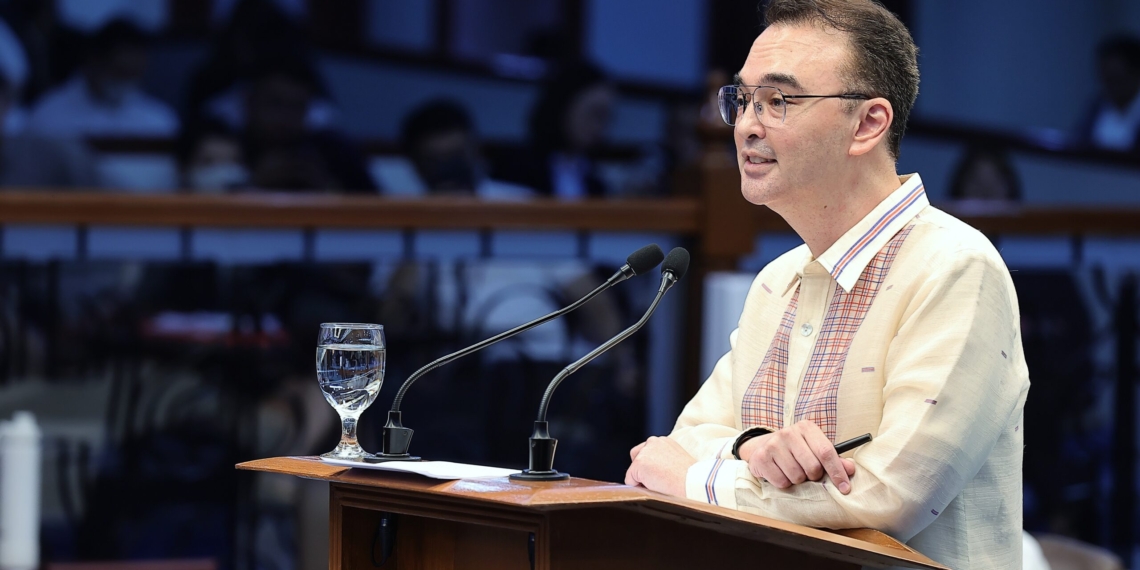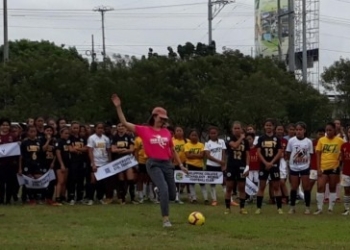Senator Alan Peter Cayetano on Wednesday said the government needs to strike a balance between handling ties with China and the challenges the country is facing in the backdrop of high inflation and increasing food prices worldwide.
Cayetano, who was Foreign Affairs Secretary in 2017-2018 under then-President Rodrigo Duterte, said foreign policy and the economy are inextricably linked, especially with contentious issues such as the West Philippine Sea (WPS).
“People might say na ang layo naman niyan [economy] sa usapan ng territories, sovereign rights, at West Philippine Sea, at ito ang burden ngayon ni President Ferdinand Bongbong Marcos. That was the burden of President Rodrigo Duterte, that was the burden of President Noynoy Aquino: (finding) the balance,” he said in a manifestation explaining his vote in favor of Senate Resolution No. (SRN) 79, which the chamber passed on August 1.
SRN 79 “strongly condemn(s) the continued harassment of Filipino fishermen and the incursions in the West Philippine Sea by the Chinese Coast Guard and militia vessels.” It takes into consideration three earlier Proposed Senate Resolutions (PSR) — PSR 659 filed by Senator Risa Hontiveros, PSR 707 filed by Senate President Juan Miguel Zubiri, and PSR 718 filed by both Hontiveros and Zubiri.
The new resolution also urges the Philippine government “to take appropriate action in asserting and securing the Philippines’ sovereign rights over its exclusive economic zone and continental shelf, and to call on China to stop its illegal activities in accordance with the United Nations Convention on The Law Of The Sea and the 2016 Ruling of the Permanent Court of Arbitration.”
Cayetano further gave context to why the WPS and the economy are related and why the government needs to take heed of what is happening in economies around the world.
“You know, during the time that we were discussing this [WPS] resolution, the Russian government had objections regarding the production of grains and the export of grains of Ukraine. And now, hindi magamit y’ung Black Sea freely to transport corn and wheat, and I think Ukraine supplies about 25% of that. Napakalaking producer ng rice ang India at nag-decide silang hindi sila mag-e-export ng rice,” he said.
He also raised the current economic challenges brought about by the agricultural and infrastructure toll in the aftermath of typhoon Egay which hit parts of the country last week and in the face of typhoon Falcon this week.
“Hindi pa nga bumababa ang tubig sa maraming lugar kasama sa hometown ni [Senator] Joel Villanueva, ang aking asawa si Lani at ang aking lolo sa Bulacan, ay may parating na naman na bagyo. Of course, the North is also badly battered and napakalaki ng damage sa agriculture and then today, may big time increase sa ating oil price, meaning ‘yung presyo ng bigas na staple natin ay apektado,” he said.
Asked by reporters if there had been economic repercussions in the past because of a diplomatic protest against China, Cayetano said the public can check the records and see that Chinese tourist arrivals dipped and banana exports were banned in China after the Philippines filed a case against China at the Permanent Court of Arbitration (PCA) in 2016.
“Check the records, naapektuhan. But we felt that was the right thing to do. The economy and what to do [in the WPS] have a relationship, but when we filed a PCA case, our exports, bananas were banned. Our tourism was slow,” Cayetano, who was chair of the Senate Foreign Affairs Committee at the time, said.
He also said that during the arbitration, Filipino fishermen were not permitted to catch fish along the Scarborough Shoal. This, however, turned around during the administration of President Duterte when the two countries talked bilaterally.
“N’ung pumasok si President Duterte, nag-usap at pwede nang mangisda. So tapos na ang arbitration award, lamang na tayo, pabor na sa atin. So that’s something the administration of Aquino balanced and thought was more important… so we should appreciate that,” he said.
“Having said that, going to the UN with the arbitration award will not get the UN to enhance the decision or enforce the decision,” he said, referring to PSR 659 filed by Senator Hontiveros last week which wanted to push the government to raise the matter to the UN General Assembly (UNGA) .
Cayetano said what is important in the short term is to look after the fishermen who source their livelihood from the seas as well as the protection of the Philippine Coast Guard and Navy. This, he said, is what encouraged him to vote in favor of adoption of SRN No. 79.
“The reason that I support this resolution, especially with the wording, is because dialogue should always be there. We never hate our enemies. Kapagka you hate your enemy, magiging emotional, baka ikaw ang magkamali samantalang klaro ang pag-iisip n’ung enemy mo. You hate their actions, you hate the sin… So we hate the actions being taken against our fishermen, our Coast Guard, and what we think we are sure of is baseless claims in the West Philippine Sea,” he explained.
“All throughout history, kapag may personal relationship, nagkakaroon ng breakthrough sa diplomacy. Despite all of the protocols, stand, loss, et cetera, kapag y’ung nag-uusap ay may tiwala sa isa’t isa, things can get done,” he added.






